Top 5 Questions About Solid Surface Resin Bathtubs for Your Bathroom
Introduction
Solid surface resin bathtubs are becoming a popular choice for modern bathrooms, yet many still have questions about their characteristics.
In this article, we’ll address five key questions about solid surface resin bathtubs to clear up any confusion.
We'll cover what makes these bathtubs unique, why certain aspects can be puzzling, and how resolving these doubts can assist you in making informed decisions about bathroom design.
Specifically, we’ll delve into what a solid surface resin bathtub is, the suitability of resin as a material, the benefits it offers, cleaning methods, and whether resin can be washed off with water.
By understanding these aspects, you'll be better equipped to choose the perfect bathtub for your bathroom.
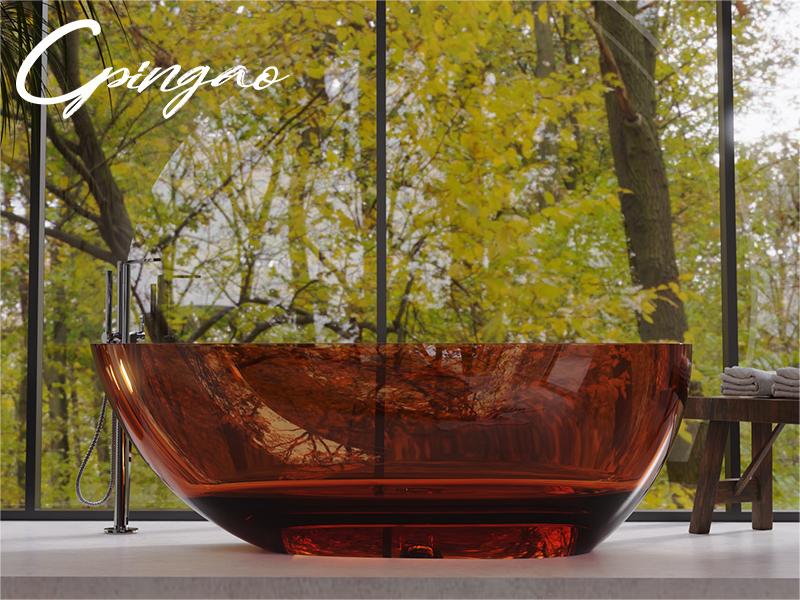
What is a Solid Surface Resin Bathtub?
A solid surface resin bathtub is a luxurious and modern bathroom fixture crafted from a composite material that combines resin and natural minerals.
This material is designed to offer both aesthetic appeal and functional benefits, making it a popular choice in contemporary bathroom designs.
Material Composition:
Resin: Usually acrylic or polyester resin acts as the binder, giving the material its smooth, moldable properties.
Mineral Fillers: Natural minerals, such as crushed stone, quartz, or other materials, are mixed with the resin. These fillers add strength, durability, and a natural look to the surface.
Key Features and Benefits:
Seamless Design: The composite material can be molded into various shapes without visible seams, providing a sleek, unified appearance.
This seamless design reduces the risk of water leakage and makes the bathtub easier to clean.
Variety of Finishes: Solid surface resin bathtubs come in a wide range of finishes and colors, allowing homeowners to match their bathtubs with their bathroom decor easily.
Whether you prefer a matte, glossy, or textured finish, there is an option to suit your taste.
Scratch and Stain Resistance: The non-porous surface is highly resistant to scratches and stains.
This feature ensures the bathtub remains in pristine condition for years, even with frequent use.
Non-Porous Surface: Being non-porous means the bathtub does not absorb water or other substances.
This property prevents the growth of mold, mildew, and bacteria, making it a hygienic choice for any bathroom.
Easy to Clean: Thanks to its non-porous nature, cleaning a solid surface resin bathtub is straightforward.
A simple wipe-down with a mild detergent and a soft cloth is usually sufficient to keep it looking new.
Repairable: If the bathtub does get scratched or damaged, it can often be repaired on-site by sanding down the affected area and polishing it to restore its original finish.
Good Thermal Insulation: Solid surface resin bathtubs have excellent thermal insulation properties, helping to maintain the water temperature longer than traditional materials. This feature ensures a more enjoyable and extended bathing experience.
High Durability: The combination of resin and mineral fillers creates a material that is highly durable and can withstand heavy use. These bathtubs are built to last and maintain their aesthetic appeal over time.
Abrasion Resistance: The surface of the bathtub resists abrasion from everyday use, maintaining its smooth and attractive finish for many years.
Understanding the composition and features of solid surface resin bathtubs can help alleviate doubts about their durability, maintenance, and overall value.
These bathtubs are an excellent choice for anyone looking to combine style, comfort, and practicality in their bathroom design.
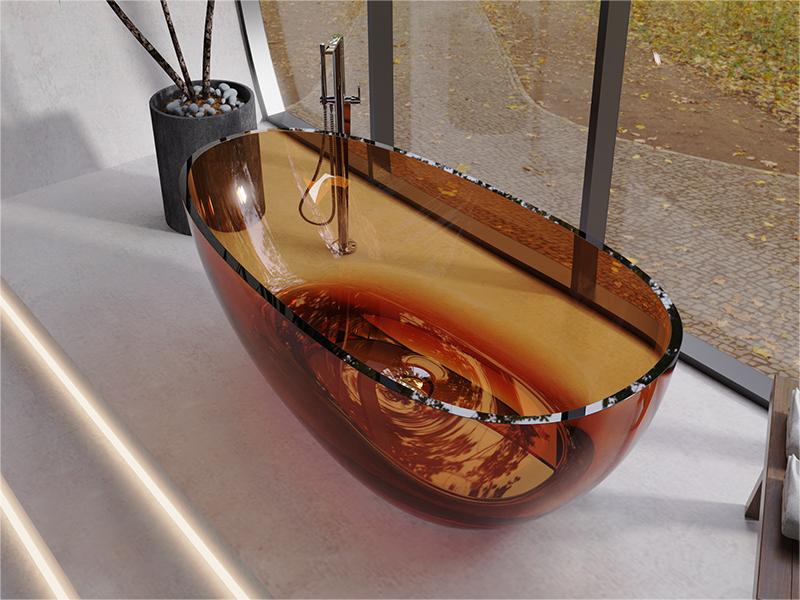
Is Resin a Good Material for a Bathtub?
Yes, resin is an excellent material for bathtubs, especially when combined with natural minerals to create solid surface resins.
This material offers a range of benefits that make it an ideal choice for modern bathroom designs.
Key Advantages:
Scratch and Impact Resistant: Resin is highly durable, withstanding daily wear and tear without easily scratching or chipping.
This resistance makes it a long-lasting choice for bathtubs.
Thermal Stability: Resin bathtubs maintain water temperature well, providing a warm and comfortable bathing experience.
This thermal stability is a significant advantage over other materials that might lose heat more quickly.
Seamless and Contemporary Designs: Resin can be molded into various shapes and sizes, allowing for sleek, seamless designs that fit modern aesthetics.
The flexibility in design also means that resin bathtubs are available in a wide range of colors and finishes, catering to diverse tastes.
Smooth and Comfortable Surface: The surface of a resin bathtub is smooth and pleasant to the touch, enhancing the overall bathing experience.
This comfort is an essential factor for those looking to create a relaxing bathroom environment.
Easy to Clean: The non-porous surface of resin bathtubs makes them resistant to stains and easy to clean.
A simple wipe-down with a mild cleaner keeps the bathtub looking new, reducing the time and effort required for maintenance.
Repairable: Minor damages, such as scratches, can usually be repaired by sanding and buffing the affected area.
This repairability ensures that the bathtub maintains its aesthetic appeal and functionality over time.
Non-Porous Surface: The non-porous nature of resin materials prevents the absorption of water, reducing the risk of mold and mildew growth.
This characteristic makes resin bathtubs a hygienic choice for any bathroom.
Considerations:
Cost: Resin bathtubs tend to be more expensive than traditional materials like acrylic or fiberglass.
This higher cost is due to the superior quality, durability, and aesthetic appeal of resin.
Weight: Resin bathtubs can be heavier than those made from acrylic or fiberglass.
This added weight might require additional structural support during installation, which can increase installation complexity and cost.
Overall, resin is a top-notch material for bathtubs, offering a blend of durability, beauty, and functionality.
Its advantages outweigh the potential drawbacks, making it a worthwhile investment for those seeking a high-quality bathtub that stands the test of time.

What Are the Benefits of a Resin Bathtub?
Resin bathtubs offer a multitude of benefits that make them an excellent choice for modern bathrooms.
Their unique properties enhance both the functionality and aesthetics of the bathroom space.
Durability and Resistance:
Scratch and Impact Resistant: Resin bathtubs are highly resistant to scratches, chips, and impacts, ensuring they remain in excellent condition for many years.
This durability makes them a reliable and long-lasting investment.
Design Versatility:
Seamless, Sleek Design: Resin allows for the creation of seamless, sleek designs that perfectly complement contemporary bathroom aesthetics.
The flexibility of resin means it can be molded into various shapes and sizes, allowing for personalized bathroom designs.
Wide Range of Colors and Finishes: Available in a plethora of colors and finishes (both matte and glossy), resin bathtubs offer great versatility in design.
Homeowners can choose from a wide array of options to match their specific tastes and bathroom decor.
Mimics Expensive Materials: Resin can imitate the look of high-end materials like natural stone, providing an upscale appearance without the associated costs.
This quality allows for luxurious bathroom designs on a more affordable budget.
Comfort and Practicality:
Good Heat Retention: Resin bathtubs have excellent heat retention properties, keeping bath water warm for longer periods.
This feature enhances the comfort and relaxation of the bathing experience, especially during colder months.
Non-Porous Surface: The non-porous nature of resin makes it resistant to staining and easy to clean.
This surface prevents the build-up of soap scum, mold, and mildew, ensuring the bathtub remains hygienic and looking new with minimal effort.
Hygienic: The non-porous surface also prevents water absorption, inhibiting the growth of bacteria, mold, and mildew.
This characteristic contributes to a more hygienic bathing environment, promoting overall health and cleanliness.
Maintenance:
Easy to Clean: The smooth, non-porous surface of resin bathtubs means they are incredibly easy to maintain.
A simple wipe with a mild detergent and a soft cloth is usually sufficient to keep the bathtub sparkling clean.
Repairable: Minor damages like scratches can often be repaired by sanding and buffing, ensuring the bathtub maintains its pristine condition over time.
These benefits make resin bathtubs a practical and stylish addition to any modern bathroom.
Their combination of durability, design versatility, comfort, and ease of maintenance ensures they are a popular choice among homeowners seeking both functionality and aesthetic appeal.
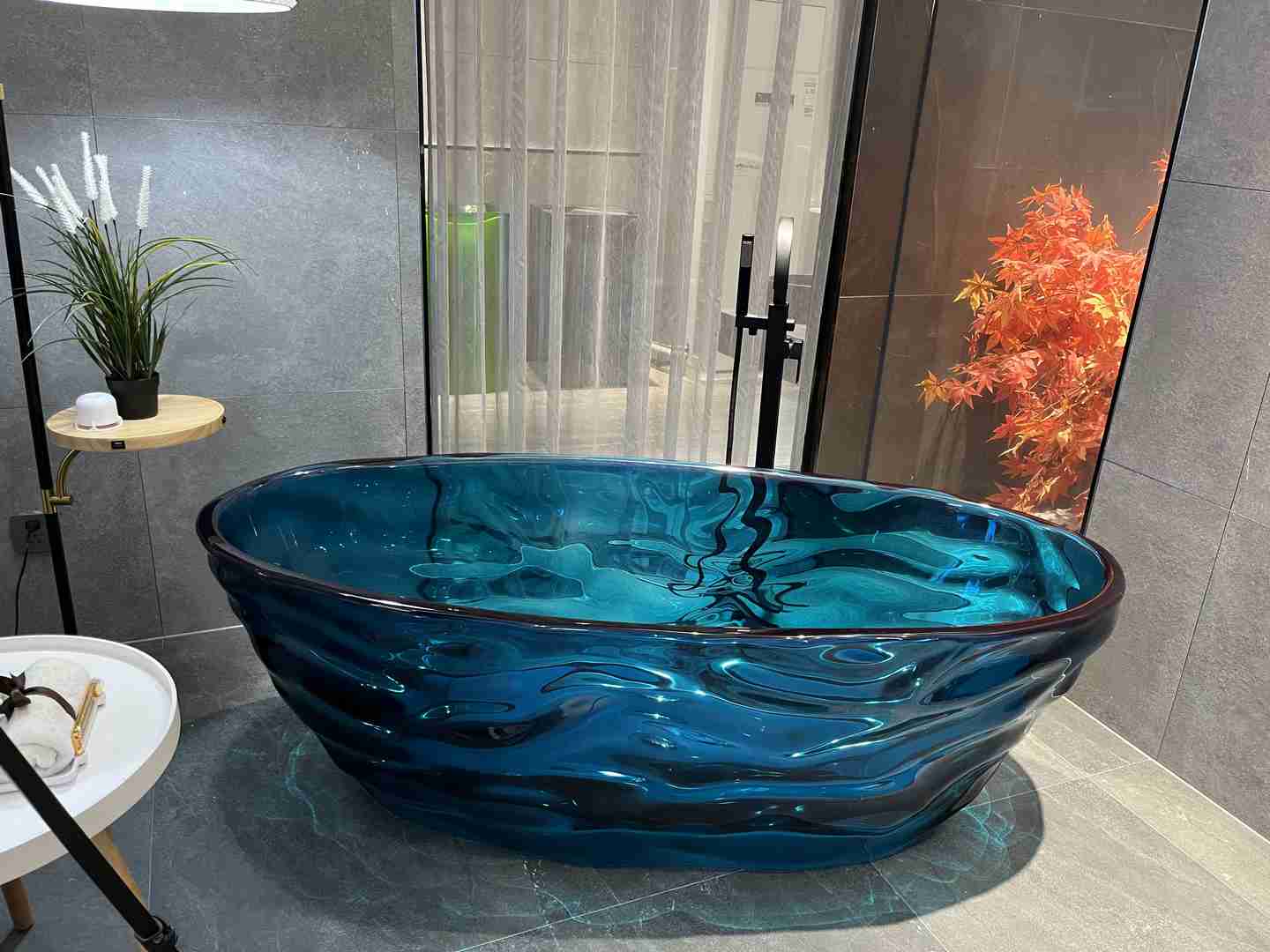
How Do You Clean a Resin Bath?
Cleaning a resin bathtub is straightforward due to its non-porous and durable surface.
Here’s a detailed guide on how to keep your resin bath in pristine condition:
Basic Cleaning Steps:
Materials Needed:
Soft cloth or sponge
Mild liquid soap or detergent
Warm water
Non-abrasive cleaner
Baking soda (for stubborn stains)
Soft brush or toothbrush (for crevices)
Rinse: Start by rinsing the tub with lukewarm water to remove any loose dirt or soap residue.
Apply Soap: Apply a small amount of mild liquid soap or detergent to a soft cloth or sponge.
Scrub: Gently scrub the entire surface of the tub with the soapy cloth or sponge, focusing on areas with soap scum or dirt.
For crevices and hard-to-reach areas, use a soft brush or toothbrush.
Rinse Thoroughly: Rinse the tub thoroughly with lukewarm water to remove all soap and detergent residue.
Dry: Dry the tub with a soft cloth to prevent water damage and ensure a streak-free finish.
For Stubborn Stains:
Baking Soda Paste: Make a paste using baking soda and a small amount of water.
Apply Paste: Apply the paste to the stained area and let it sit for about 15 to 20 minutes.
Scrub: Using a soft cloth or sponge, gently scrub the stained area with the baking soda paste. Avoid abrasive materials to prevent scratching the resin surface.
Rinse: Rinse the tub thoroughly with lukewarm water to remove the baking soda paste.
Dry: Dry the tub with a soft cloth.
Cleaning Tips:
Avoid Abrasive Cleaners: Do not use abrasive cleaners, brushes, or dishcloths as they can scratch and damage the resin surface.
Prevent Build-Up: Clean the tub regularly to prevent soap scum and mineral build-up.
Use Mild Products: Stick to mild, non-abrasive cleaning products that are safe for resin surfaces.
Avoid Harsh Chemicals: Avoid using bleach, ammonia, or other harsh chemicals that may discolor or damage the resin.
Wipe After Use: After each use, wipe the tub with a soft cloth to remove excess moisture and prevent water spots and soap scum build-up.
By following these steps and tips, you can maintain the beauty and functionality of your resin bathtub, ensuring it remains a stylish and hygienic feature in your bathroom for years to come.
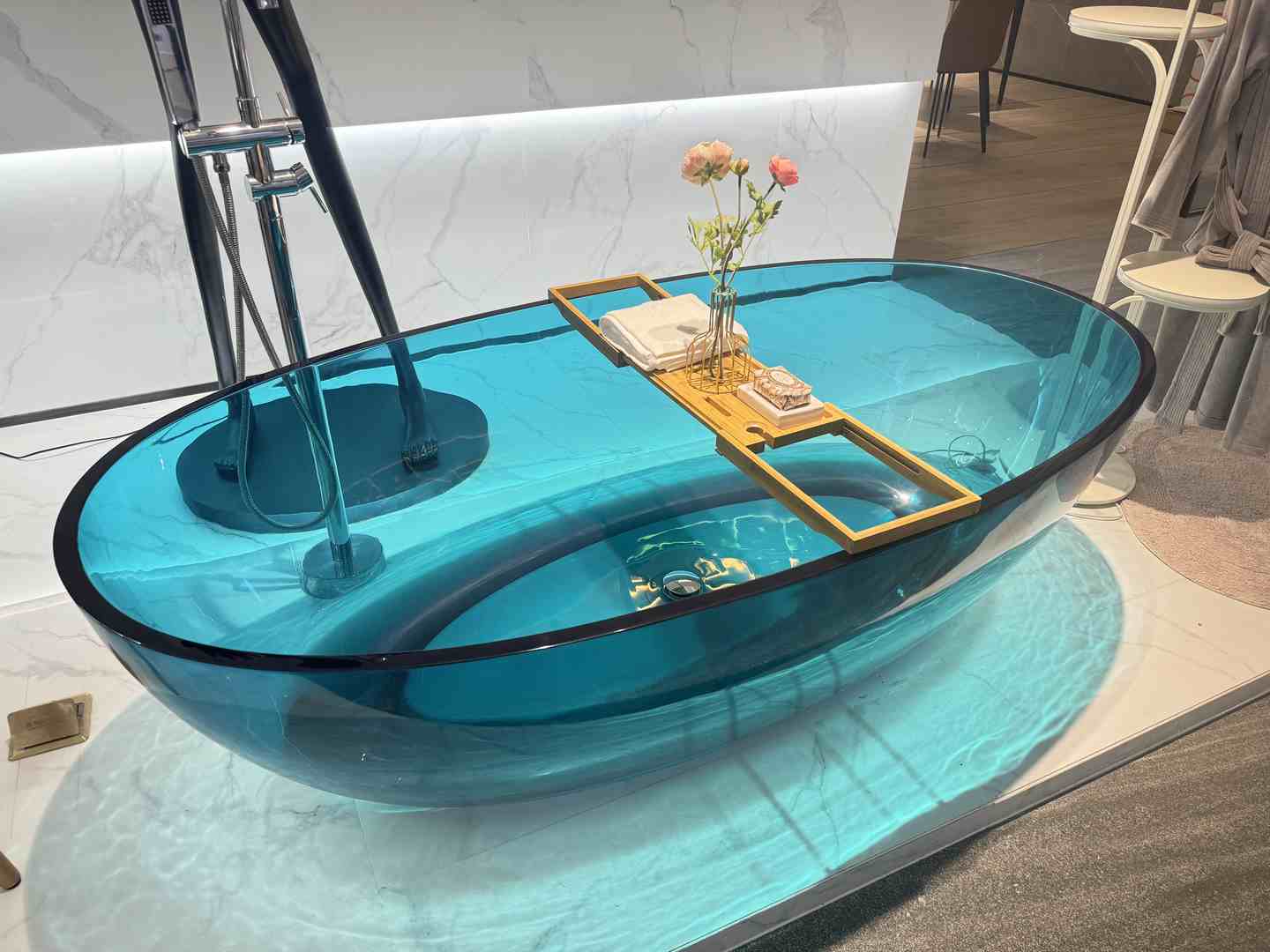
Can I Wash Resin Off with Water?
Yes, you can wash off uncured (wet) resin with water and mild soap.
However, it’s crucial to act quickly because once the resin cures and hardens, removing it with water alone becomes much more challenging.
Steps for Cleaning Uncured Resin:
Act Quickly: The sooner you clean the resin, the easier it will be to remove. Uncured resin is much more manageable and can be washed off with water.
Use Mild Soap: Combine water with mild soap to create a gentle cleaning solution.
Wash Gently: Use a soft cloth or sponge to gently wash the resin off the surface.
Rinse Thoroughly: Rinse the area with clean water to ensure all the soap and resin are removed.
Preventive Measures:
Protective Gear: Always wear gloves and protective clothing when working with resin to prevent it from sticking to your skin or clothes.
Cover Surfaces: Use dust cloths or plastic sheeting to protect work surfaces from resin spills. This preventive measure can save a lot of cleaning effort later.
Clean Tools Promptly: Immediately clean any tools or equipment used with resin. For uncured resin, use warm water and soap. For partially cured resin, a suitable solvent may be necessary.
Cleaning Cured Resin:
Once the resin has cured and hardened, it becomes significantly more difficult to remove. In such cases:
Suitable Solvent: You may need to use a specific solvent designed for resin removal.
Mechanical Removal: For stubborn cured resin, mechanical methods like scraping or sanding might be required. Always be careful to avoid damaging the underlying surface.
By following these steps and preventive measures, you can effectively manage and clean resin spills, ensuring your workspace and tools remain in good condition.
Understanding the properties of resin and acting promptly are key to maintaining a clean and safe environment.
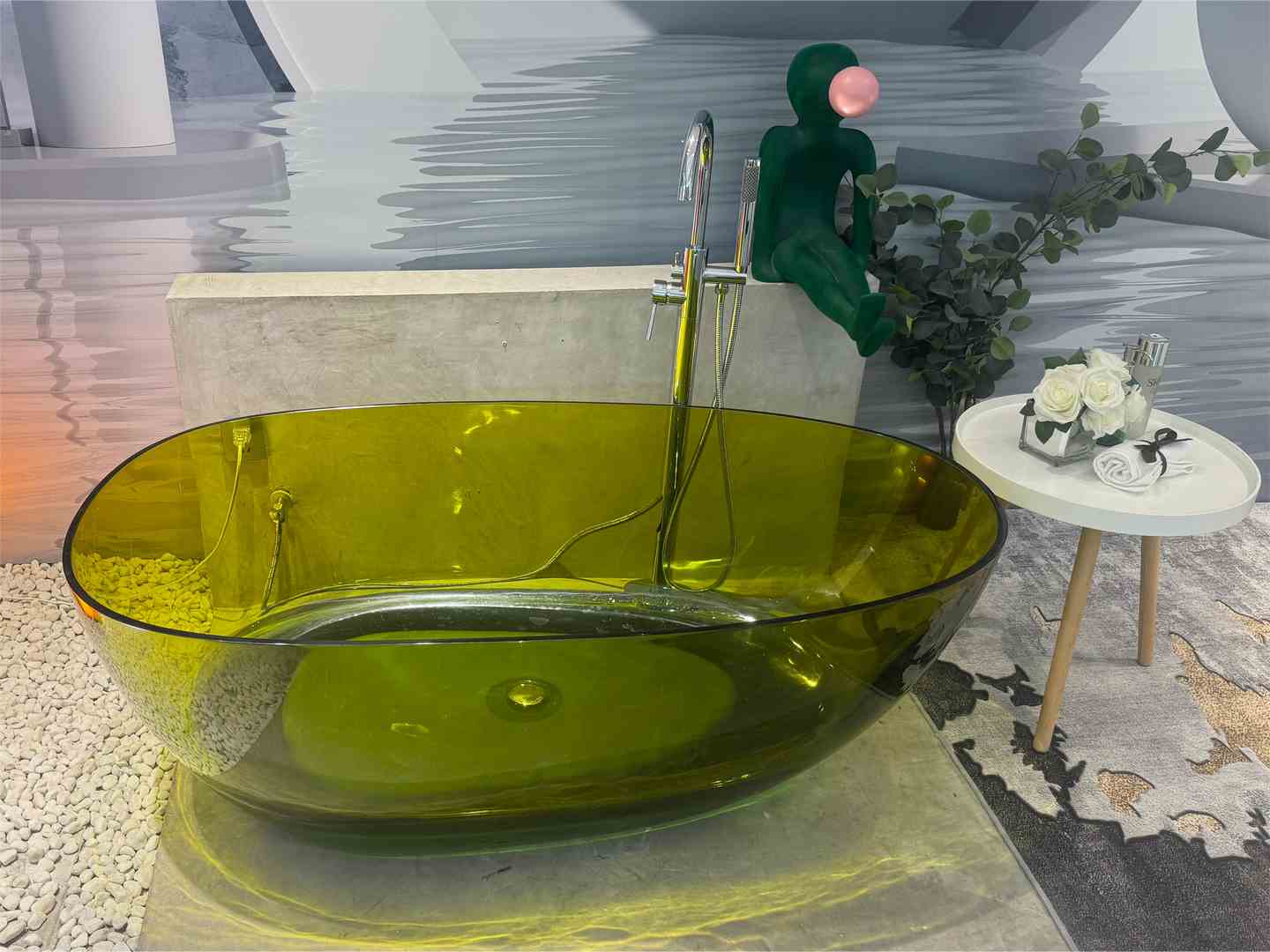
Conclusion
In this article, we addressed five key questions about solid surface resin bathtubs:
their material composition, the suitability of resin as a bathtub material, the benefits of resin bathtubs, cleaning methods, and whether resin can be washed off with water.
Among these, the most popular aspect was the wide range of benefits, including durability, design flexibility, and easy maintenance, which contributed to a higher purchase rate.
The practicality and ease of cleaning also resonated well with buyers, reinforcing the value of resin bathtubs.
The least common yet intriguing topic was the detailed cleaning methods and preventive measures, highlighting the importance of proper care to maintain the bathtubs' pristine condition.
Overall, solid surface resin bathtubs offer a blend of aesthetics and functionality, making them a top choice for modern bathrooms.
Welcome to know more detailed information about products in Cpingao:
